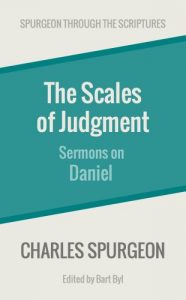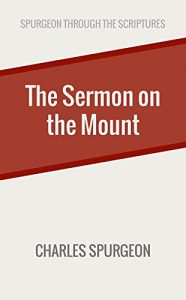Baptist pastor Charles Haddon Spurgeon is remembered today as the Prince of Preachers. But in addition to his sermons, he regularly reading a Bible passage before his message and gave a verse-by-verse exposition, rich in gospel insight and wisdom for the Christian life.
===
Sample: Colossians 1:1-5
===
Colossians 1
As we read these words, we cannot help noticing how positively the Apostle speaks. There are no, “hope so,” “trust so,” “ifs” and, “buts.” It is all, “it is so” and, “it is so.” And, beloved Brothers and Sisters, concerning eternal matters, nothing but certainties will suffice for us. Allow uncertainties about your estates if you will, but we must have positive assurance concerning eternal things. And nothing short of this ought to content our spirits. Can we all say, as we listen to these words, “God has delivered us from the power of darkness; He has translated us into the Kingdom of His dear Son, in whom we have redemption through His blood, even the forgiveness of sins”?
1, 2. Paul, an Apostle of Jesus Christ by the will of God, and Timothy, our brother, to the saints and faithful brethren in Christ which are at Colosse: Grace be unto you, and peace from God our Father and the Lord Jesus Christ. Paul begins with a salutation in which he wishes the Colossian Christians the best of all blessings. It is the very spirit of our holy religion to wish well to others and I am sure that we cannot have a better wish for our dearest friends than this, “Grace be to you, and peace.” Grace will save you—peace will make you know that you are saved. Grace is the root of every blessing—peace is the sweet flower that makes life so sweet and so fragrant. May you have both of these blessings “from God our Father and the Lord Jesus Christ”! There is no peace for you apart from this blessed combination—God, our Father, and the Lord Jesus Christ. Therefore, may you know your adoption and may you know your redemption.
3. We give thanks to God and the Father of our Lord Jesus Christ, praying always for you. Paul very graciously blends his giving of thanks and his constant prayer for these Christians at Colossae and, therein, sets us an example that we may well imitate. We are not only to pray for those who have no faith, but the very fact that men have faith should lead us to pray for them. Where there is evidently life in the seed and it begins to sprout, let us water it with our prayers and with our thanks, too.
4-5. Since we heard of your faith in Christ Jesus, and of the love which you have to all the saints, for the hope which is laid up for you in Heaven, of which you heard before in the word of the truth of the Gospel. “Faith”—“love”—“hope”—these are three Divine sisters which should always go hand in hand. We must never be satisfied unless we see in ourselves and in our fellow-Christians these three delightful fruits of the Spirit of God. Notice the order here—faith, love and then hope. Perhaps the Colossians were a little deficient in this last Grace, so the Apostle prayed constantly for them, “for the hope which is laid up for you in Heaven, whereof you heard before in the Word of the truth of the Gospel.” If there is a way of knowing the grace of God which is of no value, it is when it is not known in truth, that is to say, when it is only head-knowledge, not heart-knowledge. But, oh, when in truth the grace of God sinks into the soul and changes the whole nature, then it is an experience for which we may well give thanks to God.
===
Sample: Colossians 1:1-5
===
Colossians 1
As we read these words, we cannot help noticing how positively the Apostle speaks. There are no, “hope so,” “trust so,” “ifs” and, “buts.” It is all, “it is so” and, “it is so.” And, beloved Brothers and Sisters, concerning eternal matters, nothing but certainties will suffice for us. Allow uncertainties about your estates if you will, but we must have positive assurance concerning eternal things. And nothing short of this ought to content our spirits. Can we all say, as we listen to these words, “God has delivered us from the power of darkness; He has translated us into the Kingdom of His dear Son, in whom we have redemption through His blood, even the forgiveness of sins”?
1, 2. Paul, an Apostle of Jesus Christ by the will of God, and Timothy, our brother, to the saints and faithful brethren in Christ which are at Colosse: Grace be unto you, and peace from God our Father and the Lord Jesus Christ. Paul begins with a salutation in which he wishes the Colossian Christians the best of all blessings. It is the very spirit of our holy religion to wish well to others and I am sure that we cannot have a better wish for our dearest friends than this, “Grace be to you, and peace.” Grace will save you—peace will make you know that you are saved. Grace is the root of every blessing—peace is the sweet flower that makes life so sweet and so fragrant. May you have both of these blessings “from God our Father and the Lord Jesus Christ”! There is no peace for you apart from this blessed combination—God, our Father, and the Lord Jesus Christ. Therefore, may you know your adoption and may you know your redemption.
3. We give thanks to God and the Father of our Lord Jesus Christ, praying always for you. Paul very graciously blends his giving of thanks and his constant prayer for these Christians at Colossae and, therein, sets us an example that we may well imitate. We are not only to pray for those who have no faith, but the very fact that men have faith should lead us to pray for them. Where there is evidently life in the seed and it begins to sprout, let us water it with our prayers and with our thanks, too.
4-5. Since we heard of your faith in Christ Jesus, and of the love which you have to all the saints, for the hope which is laid up for you in Heaven, of which you heard before in the word of the truth of the Gospel. “Faith”—“love”—“hope”—these are three Divine sisters which should always go hand in hand. We must never be satisfied unless we see in ourselves and in our fellow-Christians these three delightful fruits of the Spirit of God. Notice the order here—faith, love and then hope. Perhaps the Colossians were a little deficient in this last Grace, so the Apostle prayed constantly for them, “for the hope which is laid up for you in Heaven, whereof you heard before in the Word of the truth of the Gospel.” If there is a way of knowing the grace of God which is of no value, it is when it is not known in truth, that is to say, when it is only head-knowledge, not heart-knowledge. But, oh, when in truth the grace of God sinks into the soul and changes the whole nature, then it is an experience for which we may well give thanks to God.












